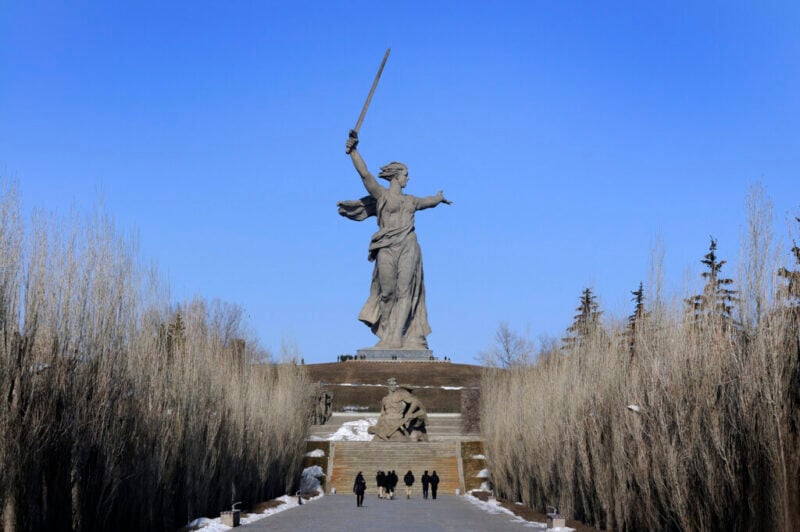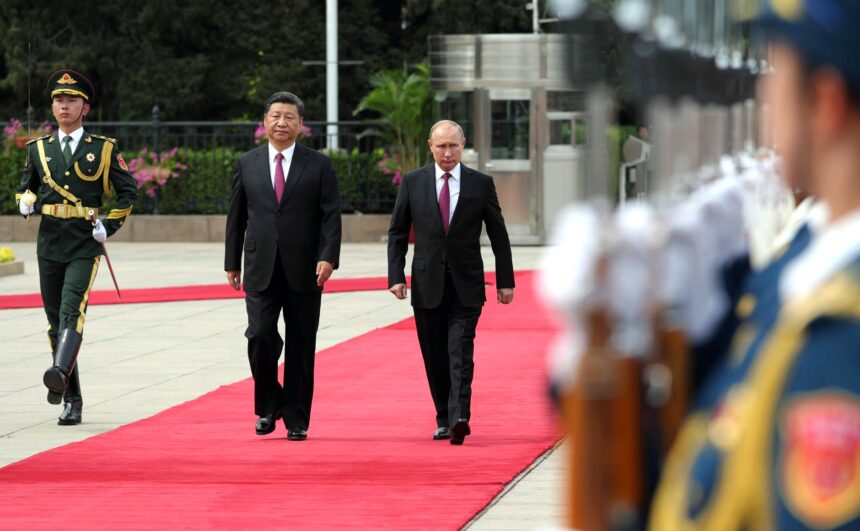Despite their Communist past and present, Russia and China are demonstrably more conservative in many ways than present-day, self-hating America.
What are conservative values? Freedom of speech? Free markets? Guns? Not necessarily. Although relevant, these things do not define what it means to preserve one’s civilization and way of life. That task requires the active protection of heritage, traditions, religious values, traditional gender roles, native fertility rates above replacement levels, strong nuclear families, strong borders, restrictive immigration laws, and a common national identity. The guns, free speech, and free markets can only exist if the underlying structures are intact. Without those structures, a nation cannot survive and thrive. America is failing in these basic requirements—but Russia and China are not.
Nevertheless, Democrats and Republicans alike decry both China and Russia for their authoritarian ways and suppression of freedom. China, for example, is guilty of oppressing the Uighur Muslims in Xinjiang Province and the pro-democracy protesters in Hong Kong, of surveilling their citizens, of implementing social credit scores, of control over media and banning of Western news sources. Russia, likewise, is known for the arrest, detention, and torture of Russian democracy activist Alexei Navalny for the alleged rigging of Russian elections in favor of the United Russia Party and its allies, for its invasion of Ukraine and seizure and annexation of Crimea as well as for the arming and backing of breakaway states in Ukraine and Georgia.
Although American politicians and the American media highlight and occasionally exaggerate the oppressive features of these foreign regimes, partly to glorify their sometimes-idealized alternative, there is no reason to deny that these governments do unpleasant things. That is unfortunately the case. But they also show a socially conservative side that is worth exploring. Let us consider China first.

It is true that Mao’s five-year plan and cultural revolution were disastrous and resulted in the deaths of millions. He attempted to eradicate traditional Chinese culture and impose his interpretation of cultural Marxism on his entire society. But this experiment faded with Mao’s demise in 1976 and the transfer of power to Deng Xiaopeng, who was more of a pragmatist. Even to this day, Xi Jinping, who has amassed complete control over the CCP and created a cult of personality rivaling Mao’s, remains a nationalist and has gradually moved the CCP away from the fine points of Marxist thought, much to the chagrin of the die-hard Marxists of the party’s past.
The CCP, while authoritarian, strongly upholds traditional views on gender roles, race, sexuality, and family—more so than the Republican Party or mainstream conservatives in America. A major example of China’s conservatism is the CCP’s view on LGBTQ rights. Same-sex couples are unable to marry or adopt, and households headed by such couples are ineligible for the same legal protections available to heterosexual couples, and no anti-discrimination protections exist for LGBTQ people. Contrast these policies with the views of mainstream American conservatism, which now seems deeply committed to gay marriage, an institution enthusiastically endorsed by the likes of National Review and the National Conservatism Conference.
The online availability of South Korean and American popular entertainment has made some young Chinese more open in their support for LGBTQ issues. Because the CCP has complete control over media and entertainment, however, the state has acted in recent years to block and ban all LGBTQ-related issues on various platforms, such as Weibo, China’s equivalent of Facebook. Also outlawed is the depiction on television of effeminate men—known as niang pao, or “girlie guns.” The CCP is clearly and understandably concerned about the effect of effeminate Chinese pop stars on China’s youth. In addition, the Mao-era All China Women’s Federation, which was founded to promote the Marxist view of women’s rights, has gradually taken the backseat in the modern CCP and is dwindling in membership.
In short, Chinese leaders seek to promote masculinity and strength, and to uphold and expand their inherited Han civilization. They feel they cannot do that with homosexuals, transgenders, or feminists running government institutions and the military—or even exerting influence over forms of entertainment.
Another way that the CCP tries to protect its youth is by a recently mandated limit of three hours per week for online gaming and by prohibiting it altogether during school days. The CCP has further mandated that game developers must submit new titles for government approval before their release, and the developers are encouraged to include nationalistic themes.
Instead of allowing their youth to descend into unlimited virtual gaming, the government has financially backed fitness and discipline camps (akin to Boy Scouts on steroids) for elementary, middle, and high school–aged boys. While this may seem drastic, the CCP leadership sees these moves as necessary to prevent China’s youth from becoming like the West’s increasingly feminized and entitled generation, who prioritize trans rights, political correctness, and diversity over the preservation of national identity and inherited social mores.

(Jakub Hałun / via Wikimedia Commons, CC BY-SA 3.0)
The irony of all this is that while China censors and outlaws cultural Marxist behavior within China, it actively encourages the same in the West; in other words, the CCP is keenly aware of the destructive nature of “woke” politics. The party actively promotes the Black Lives Matter movement in the West and purchases ownership stakes in Western entertainment companies. This allows the Chinese government to push a feminized Western culture while simultaneously showing Chinese culture as a masculine one with soaring global power.
Since the rise of Xi, the CCP has expanded into developing countries via predatory lending policies, promising to pay for major development projects in exchange for special access to resources, control of major ports, or the installation of military bases. It has built man-made islands in the South China Sea to assert control over global trade routes. In the West, the CCP has secured major business deals and purchased majority shareholder status in publicly traded companies through state-owned enterprises and loyal private corporations, in order to exert influence over Western countries. It has also encouraged or intimidated ethnic Han overseas to remain loyal to the will of the party and the nation, even if they are not Chinese citizens. The CCP, being ethno-nationalists, see anyone that is ethnically Han as part of the greater Chinese diaspora and therefore required to come to the party’s aid.
While China censors and outlaws cultural Marxist behavior within China, it actively encourages the same in the West; in other words, the CCP is keenly aware of the destructive nature of “woke” politics.
The CCP’s reduced presence would likely be a good thing for the West, but there are unanswered questions. Notwithstanding the global political and economic power vacuum that would arise as a result, the establishment of a Western, state-of-the-art liberal democracy in China would not be a good fit for the Chinese people. The global corporate forces that are tearing down Western culture would attempt to do the same for China and would have a field day inflicting their progressive ideas, lifestyles, and products to a brand-new market of 1.4 billion customers. It would end up like its counterpart, Taiwan, which is steadily becoming more woke under the ruling Democratic Progressive Party, which promotes feminism and LGBTQ rights. This is a direct result of Western media and pop culture influence, and exactly what the CCP wishes to avoid.
In an ideal world, the restoration of a traditionalist monarch, which China had during the Qing Dynasty and prior to the later nationalist government of Chiang Kai-shek, would preserve China’s ancient cultural traditions. But that is not likely to happen. Born from cultural revolution, the Communist Party of China has ironically become the preserver of the traditional Chinese nation under today’s globalist economic and political system.
We in the West criticize, sanction, and virtue signal China for human rights abuses such as cracking down on Hong Kong protesters and persecuting Uighur Muslims. Meanwhile, the CCP gladly appeals to Western corporate greed in order to turn our wokeness against us.

What about Russia? Why is it that the successor state to the evil Soviet Empire has strict laws limiting homosexual expression and supporting traditional gender roles, Christian morals, and national identity? Why didn’t Russia fall into the same cultural Marxist milieu that other white, onetime Christian nations have been experiencing?
Following the Russian Revolution of 1917 and the destruction of the centuries-old Russian Empire, Vladimir Lenin attempted briefly to introduce liberal social policies. His reign was short-lived, as he died of an illness in 1924, and was succeeded by the much more socially conservative Joseph Stalin. Stalin was far more brutal than his predecessor but also far more nationalistic. Under Stalin, the Soviet Union was economically Communist but featured profoundly patriotic art and music, and discouraged such modern innovations as twelve-tone music and abstract art.
Stalin took this line to enhance social discipline while working to increase Russia’s population through the glorification of motherhood. Stalin outlawed homosexuality, placed restrictions on divorce, and shut down the short-lived Zhenotdel, a state-run organization set up by the Bolsheviks to promote a feminist agenda. These policies have left their mark on today’s Russia, where even the present Russian Communist Party joined the very conservative United Russia Party in ardently supporting a 2013 law banning the promotion of homosexuality in the Russian Federation.

(via flickr, CC By ND-2.0)
Despite decriminalizing homosexual acts in 1993, Russia classified homosexuality as a mental illness in 1999, and same-sex couples are ineligible for the legal protections available to opposite-sex couples. There are currently no separate laws prohibiting discrimination based on sexual orientation in Russia. Transgender people are allowed to change their legal gender following sex reassignment surgery; however, there are currently no laws prohibiting discrimination based on gender identity or expression, and recent laws could discriminate against transgender residents. Although gay and lesbian individuals are legally allowed to serve openly in the military, there is a de facto “Don’t ask, don’t tell” policy. In 2012, gay pride parades were outlawed nationwide until the year 2112—simply because Russian laws can only exist on the books for 100 years, after which they have to be renewed.
The Russia of the 1990s saw a religious reversal by the Russian state, from mandating atheism to promoting church membership. Despite the prior Communist
oppression of religion, religiosity sprang back with vigor after the downfall of the Soviet Union. Today, President Vladimir Putin and his ruling United Russia Party have a close working relationship with the Russian Orthodox Church, and the nation is overwhelmingly Christian, with the exceptions in the historically Muslim Caucasus region and Buddhist regions along the Mongolian border.
Russian identity remains strong, with most regions supporting the ruling United Russia Party. Strong immigration laws also exist and enjoy widespread support.

In Russia and China, despite their longtime Communist regimes, the Marxist ideology has not taken root. There is no guilt or self-hatred for past actions, and the few that actually do espouse these ideas are societal outcasts, not recipients of book deals or television stardom, like in the West. The nuclear family and traditional gender roles remain intact. In Russia’s case, this allowed for an easy transition to embracing the Orthodox Church after the fall of the Soviet Union in 1991. In China’s case, despite remaining Communist, traditional ideas about nation, race, gender, sexuality, and family stand strong, indeed with support from the Communist Party.
Self-hatred in the form of questioning societal mores, gender roles, the concepts of parenthood and family, national identity, and so forth, seems to be a uniquely Western, postmodern phenomenon. After centuries of the glacial advance of liberalization, the West’s embrace of cultural Marxism, guilt, and self-hatred sprang into existence with the countercultural movement of the 1960s, snowballing into feminism, LGBTQ rights, and the rejection of the nuclear family. This upheaval, coupled with almost unrestricted immigration, degraded the religious and cultural components of the older Western order and brought forth a disjointed, multicultural America.
In their desire to destroy their own heritage, America’s neoconservative and neoliberal elites won’t stop at implementing cultural Marxism domestically. These cosmopolitans want to spread these morally subversive ideas to traditional cultures globally. Through the United States Agency for International Development, the federal government spends taxpayer dollars on promoting LGBTQ and women’s rights in developing nations. And this doesn’t include the numerous nongovernmental organizations that work in lockstep to push the same neoliberal ideas onto cultures that simply have no interest in American democracy, women’s rights, and the LGBTQ agenda.
Apparently, the complete restructuring of their own society just wasn’t enough for the Western elites; they desperately want the people of nations like Afghanistan to embrace liberal democracy and be sexually liberated and feminized—just like America—while also bombing them into submission. It’s no wonder that Russia and China, by way of contrast, seem appealing to many of these developing nations. Russia and China want to exploit the resources of these countries, yes—but at least they don’t attempt to impose ideology or to destroy the native cultures.
A comparison of recent Russian and Chinese military recruitment ads with America’s underscores a simple reality: Russia and China promote and uphold a strong, masculine, traditional culture that wishes to make its mark on the world, while America promotes a weak, feminized, sensitive culture that placates women, minorities, disabled, and homosexuals in an effort to have a more inclusive and caring military.
In 50 years, the real warriors of the United States military will have retired and what is left will be an inclusive, multicultural, multilingual, multireligious smorgasbord composed of sensitive men, women, and nonbinary people who prioritize feelings over national defense. Which nation is likely to win in the battle for global dominance, then? Let’s think about that.
Top image: People’s Republic of China President Xi Jinping welcomes Russian President Vladimir Putin to China in a 2018 official ceremony.
(Kremlin.ru / via Wikimedia Commons, CC BY 3.0)

Leave a Reply